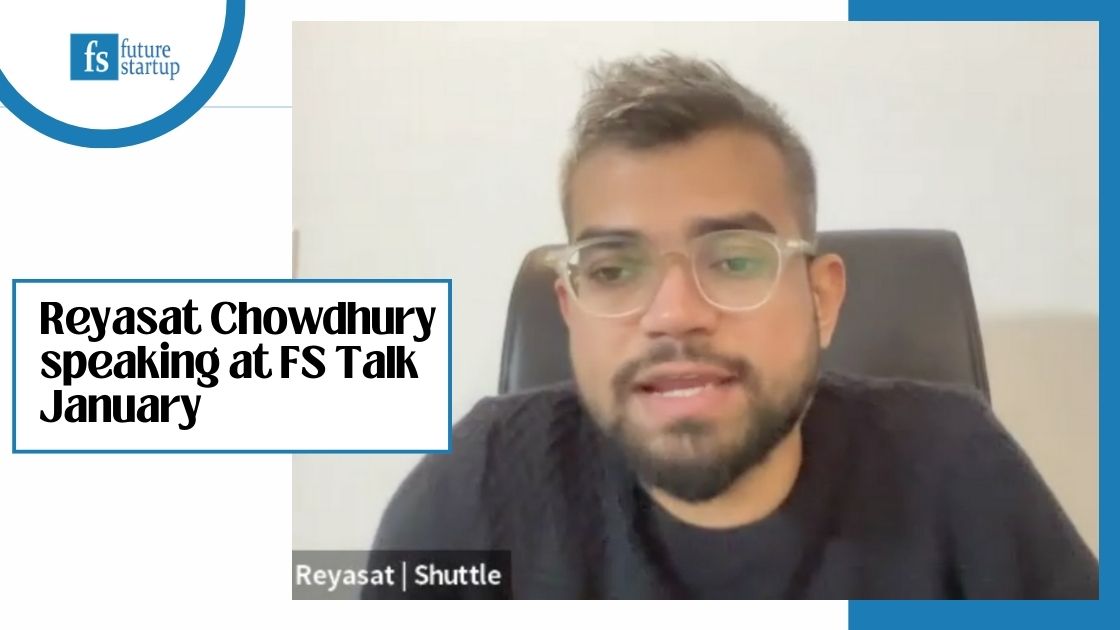
Speaking at the FS Talk January, held virtually on 28th January 2023, transportation tech startup Shuttle Co-founder and CEO Reyasat Chowdhury said they started Shuttle without an app, with two minivans, and did everything manually using excel and other tools in the early months. The move was supremely advantageous for Shuttle. It allowed the company to gather useful customer feedback from the market and evolve quickly without waiting and spending on something that might not work.
The observation offers useful lessons for aspiring founders.“We started without an app,” said Reyasat. “We had a basic website. We created a Google form using which people could book their trips and that was it. It helped us to launch into the market early and gather useful customer feedback. We could have waited to build an app and then launch the service but it would have taken us another six months to launch and also additional costs to build an app we didn’t know whether it would work or not.”
He said it is always useful to launch early and launch as scrappy as possible. You will never be able to launch a perfect product. Moreover, before launching your product to the market, you don’t know whether your product will work or not. To that end, instead of building a product that might not work in the market, it is always better to launch a basic product, get feedback from the market and build it as you go.
Reyasat also shared the journey of Shuttle, how the company has evolved over the years, the challenges the company faced in the early days, and mistakes he and his team made in the early days, and the lessons he learned from the journey so far. The talk was attended by a small group of founders and business and tech professionals. Here and three key takeaways from the talk:
1. Idea maze is real: During the talk, Reyasat Chowdhury shared the evolution of the Shuttle over the years. He said Shuttle originally wanted to disrupt public transportation space in Bangladesh by helping the existing bus and other public transport providers. But the founders realized early on that it wouldn’t work because existing public transport companies already make good money and they wouldn’t be interested in paying for an additional service that might not help them earn more money. The founders then pivoted to the current idea of Shuttle, which is providing a transportation service to female university-going students in Dhaka that would be cheaper than ride-hailing services but better than public transport in Dhaka. Shuttle has since evolved and launched multiple services. It continues to transportation to female students and office goers. However, the company has also launched a common service for both males and females. It has introduced a shuttle for business service. The point I wanted to make here is that ideas are not static. Ideas evolve. What we see from the outside is just the manifestation of an idea maze. I have previously written about the idea maze and why it is important to understand because most ideas go through a journey that we don’t see from the outside. It is useful to know that for many different reasons
2. Talk to your customers: When Shuttle founders decided that they wanted to launch a transportation service for female university-going students, they took out time and went to different private universities in Dhaka and talked to female students to understand whether it is a problem for them and whether they would use it if there was a service like Shuttle. “In the early days, my co-founder Jawad bhai would spend the literally whole day speaking with customers,” said Reyasat. This helped the Shuttle team to develop their unique insight into the market and the problem.
3. Be relentlessly resourceful: Part of the reason Shuttle started with minivans in the early days is that it is the easiest way to start a transportation company without facing any legal challenges. Your driver and your vehicle will have to all the proper documents but there are not many legal requirements. Finding this way out allowed Shuttle to quickly launch its product and get market feedback instead of going through lengthy permission processes. Shuttle team has consistently shown resourcefulness throughout their journey. In the early days, Shuttle had trips starting at 6:30 am the morning to 10:30 pm. The shuttle team would start working at 5:00 am that would continue till 11:00 pm. Paul Graham says exceptional founders are relentlessly resourceful. They find a way out and get things done.
The talk was full of actionable insights and inspiration for founders and professionals alike. We plan to release a video version of the talk in the coming weeks. Keep an eye on the FS website.
Founded in 2018, Shuttle initially started as a transportation service for women, predominantly for female students. The company has since expanded and launched multiple services including a common service for both males and females, a shuttle for business service where it helps companies to provide transportation service to their employees, and is now working on a shuttle for school service for schools in Dhaka.
FS Talk, a monthly event series from Future Startup, is a small, friendly gathering of entrepreneurs, change-makers, doers, and artists from a wide range of backgrounds where people come together to talk about all things entrepreneurship, building things, trials and tribulations of entrepreneurial journeys, and meet each other and share ideas and opportunities. Future Startup relaunched the talk series in 2022 with an ambition to build a community to promote and enable entrepreneurship and entrepreneurial thinking. The talk takes place virtually on the last Saturday of every month. Falk Talk January was the 3rd event of the series. To stay updated on our upcoming events, join our email list here.
